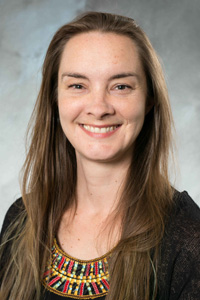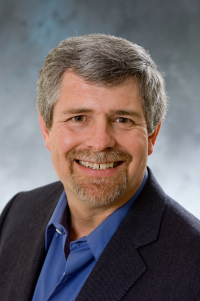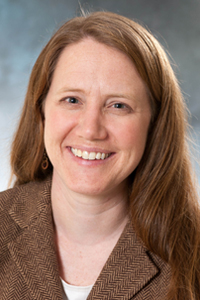Northwestern psychology professors present research at international conferences
Thursday, June 7, 2018
Three psychology professors from Northwestern College—Drs. Melanie Nyhof, Laird Edman and Jennifer Feenstra—presented their research at international conferences in May.
 Nyhof and Edman presented at a symposium, Future Directions on the Evolution of Rituals, Beliefs and Religious Minds, in Sicily May 9–14. Hosted by The Ettore Majorana Foundation and Centre for Scientific Culture, the symposium provided scholars the opportunity to discuss the cognitive science of religion. Kirsten Lesage, a 2013 Northwestern alumna and doctoral candidate at the University of California, Riverside, also presented a poster at the symposium.
Nyhof and Edman presented at a symposium, Future Directions on the Evolution of Rituals, Beliefs and Religious Minds, in Sicily May 9–14. Hosted by The Ettore Majorana Foundation and Centre for Scientific Culture, the symposium provided scholars the opportunity to discuss the cognitive science of religion. Kirsten Lesage, a 2013 Northwestern alumna and doctoral candidate at the University of California, Riverside, also presented a poster at the symposium.
Nyhof was one of six researchers invited to present her research to all conference attendees. “Melanie’s invitation to present before the entire conference is a testament to how respected she is in this field,” says Edman.
Nyhof’s presentation, “The Role of Religion, Humility and Tolerance in Belief Disagreements Among Indonesian Muslims,” focused on her ongoing research of tolerance of differing religious viewpoints in Indonesia.
“Indonesia is a Muslim-majority country known for tolerance of differing religious viewpoints, but more recent events have called into question that tolerant reputation,” says Nyhof. “This intolerance has been evident among social media users in Indonesia.” Nyhof presented the findings of two of the studies within her research, done in collaboration with two psychology faculty, Rena Latifa and Abdul Rahman Saleh, from Indonesia.
 Edman presented a poster titled “Theory of Mind, Mysticism and Absorption: Relationships With the Experience of God.” The poster included the results of research conducted the last two years by Edman in collaboration with Dr. Emily Dykstra, instructor in psychology at Northwestern, and nine Northwestern students.
Edman presented a poster titled “Theory of Mind, Mysticism and Absorption: Relationships With the Experience of God.” The poster included the results of research conducted the last two years by Edman in collaboration with Dr. Emily Dykstra, instructor in psychology at Northwestern, and nine Northwestern students.
“When people think about God, they try to discern God’s mind and emotions the same way they try to figure out what other people are thinking and feeling—they use their ‘theory of mind’ to theorize about God’s thoughts. This has implications for the way people pray and how they experience the presence of God,” says Edman. “Different people pray and experience God very differently, and our research team hypothesizes that part of these differences is related to people’s different abilities to understand other minds.”
Edman also assisted in organizing a symposium at the annual conference of the Canadian Scientific and Christian Affiliation, held in British Columbia on May 13. The symposium, The Scientific Study of Religion and Lived Faith: Collision and Collusion, focused on matters that arise from Christian engagement in the scientific study of religion.
A paper by Edman, “The Cognitive Science of Religion Applied: Implications for Faith-Based Settings,” was presented at the symposium. Dr. Myron Penner, professor of philosophy at Trinity Western University in British Columbia, presented the paper on Edman’s behalf. Penner and Edman collaborate on several writing projects regarding the applications of the cognitive science of religion.
“While the cognitive science of religion has been perceived as a challenge to religious belief, it can also be useful for the church,” says Edman.
 Feenstra presented her scholarship, funded by an Endowed Research Fellowship from Northwestern, at the Society for the Study of Emerging Adulthood conference in Romania on May 17. The conference brought together researchers and practitioners to discuss self and identity development in emerging adulthood. Feenstra’s presentation was titled “Positive Youth Development Program Participation and Positive Qualities in Emerging Adulthood: A Study of Romanian Youth.”
Feenstra presented her scholarship, funded by an Endowed Research Fellowship from Northwestern, at the Society for the Study of Emerging Adulthood conference in Romania on May 17. The conference brought together researchers and practitioners to discuss self and identity development in emerging adulthood. Feenstra’s presentation was titled “Positive Youth Development Program Participation and Positive Qualities in Emerging Adulthood: A Study of Romanian Youth.”
Feenstra’s research focuses on the impact of youth development programs in Romania and whether they assist youth in developing the skills they need to succeed in adulthood. Her research was focused on former participants of programs offered by New Horizons Foundation, Northwestern’s partner in the college’s Romania Semester study abroad program.
“In emerging adulthood, those who had participated in a youth development program showed significantly greater autonomy, personal growth, sense of purpose in life and self-acceptance than those who had not participated in such a program,” says Feenstra.

